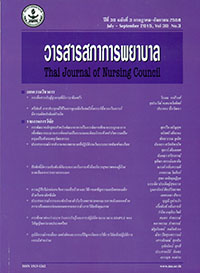ประสบการณ์การนอนพักรักษาตัวในโรงพยาบาลของมารดาหลังคลอด ด้วยภาวะเลือดออกก่อนคลอดจากรกเกาะตำ: การวิจัยเชิงคุณภาพ
Keywords:
ประสบการณ์, การนอนพักรักษาตัวในโรงพยาบาล, มารดาหลังคลอด, ภาวะเลือดออกก่อนคลอด, จากรกเกาะต่ำการวิจัยเชิงคุณภาพ, experience, hospitalisation, post-natal, mothers, pre-natal bleeding, placenta previa, qualitative researchAbstract
บทคัดย่อ: วัตถุประสงค์ของการวิจัย: เพื่อศึกษาการรับรู้ต่อประสบการณ์การนอนพักรักษา ตัวในโรงพยาบาลด้วยภาวะเลือดออกก่อนคลอดจากรกเกาะต่ำของมารดาหลังคลอด นับตั้งแต่ รับรู้ว่ามีรกเกาะต่ำในขณะตั้งครรภ์จนถึงบุตรมีอายุไม่เกิน 1 ปี
การออกแบบวิจัย: การวิจัยแบบพรรณาเชิงคุณภาพ
การดำเนินการวิจัย: การวิจัยเชิงคุณภาพนี้เป็นส่วนหนึ่งจากการวิจัยเรื่อง “ประสบการณ์ ชีวิตของมารดาหลังคลอดที่มีภาวะเลือดออกก่อนคลอดจากรกเกาะต่ำ” เก็บรวบรวมข้อมูล ด้วยการสัมภาษณ์เชิงลึก จากผู้ให้ข้อมูลจำนวน 9 คน ระหว่างเดือนพฤษภาคม – พฤศจิกายน 2557 เครื่องมือที่ใช้ในการรวบรวมข้อมูล ได้แก่ ผู้วิจัย แบบสอบถามข้อมูลส่วนบุคคล และแนวคำถาม ในการสัมภาษณ์แบบกึ่งโครงสร้าง วิเคราะห์ข้อมูลคุณภาพโดยวิธีวิเคราะห์ข้อมูลเชิงเนื้อหา
ผลการวิจัย: พบว่า ผู้ให้ข้อมูลมีการรับรู้ต่อประสบการณ์นี้ว่าเป็นภาวะตึงเครียด ดังนี้ 1) กลัวและเครียด 2) หงุดหงิด เบื่อ ล้า และอยากกลับบ้าน 3) สองจิตสองใจระหว่าง ความต้องการของตนเองกับสุขภาพของบุตร 4) รู้สึกไม่แน่นอนต่อสิ่งที่จะเกิดขึ้น 5) อยู่ด้วย ความรอคอยวันที่ลูกจะเกิด 6) ทรมานกับแผนการรักษา 7) เผชิญกับบรรยากาศตึงเครียด ของหอผู้ป่วย 8) ไม่ได้รับการตอบสนองความต้องการ และ 9) ห่วงภาระหน้าที่
ข้อเสนอแนะ: ผลการศึกษาครั้งนี้ช่วยให้พยาบาลตระหนักต่อการรับรู้ของสตรีที่นอน พักรักษาตัวในโรงพยาบาลด้วยภาวะเลือดออกก่อนคลอดจากรกเกาะต่ำพยาบาลควรประเมิน ความเครียดและภาวะกดดันทางอารมณ์ ตลอดจนการให้ข้อมูลและการพัฒนาแนวทางเพื่อลด ภาวะดังกล่าว การจัดสิ่งแวดล้อมและสร้างบรรยากาศให้ผ่อนคลาย อีกทั้งพยาบาลควรสนับสนุน และกระตุ้นให้สามีและสมาชิกในครอบครัวเข้ามามีส่วนร่วมในการดูแลสตรีที่เผชิญภาวะนี้มากขึ้น
Abstract: Objective: To examine post-delivery hospitalisation experience perceived by mothers with pre-natal bleeding, between the detection of placenta previa and just before their babies turned one year old.
Design: Descriptive qualitative research.
Implementation: This study was conducted as part of the research project titled ‘Experience of Mothers with Pre-Natal Bleeding Caused by Placenta Previa’. Data were collected by means of in-depth interviews with 9 informants, between May and November 2014. The data-collecting instruments were the researcher, a personal information questionnaire, and a semi-structured interview questions. The qualitative data were analysed using content analysis methods.
Results: Based on the study, the subjects identified their experience as involving: (1) fear and stress; (2) irritation, boredom, fatigue, and desire to go home; (3) a quandary between their personal needs and their babies’ health; (4) uncertainty about what might happen to them; (5) expectation of the births of their newborns; (6) torment by the treatment process; (7) stress caused by the ward’s atmosphere; (8) failure to have their needs met; and (9) worries about their careers and obligations.
Recommendations: The results of this study could help nurses to increase their awareness of and readiness for the task of assessing the emotional conditions and stress faced by female patients being hospitalised due to pre-natal bleeding resulting from placenta previa. It is suggested that nurses provide sufficient information and develop practical approaches to alleviating this condition. Creating an environment and atmosphere conducive to emotional relaxation, as well as promoting engagement of husbands and family members in caring for such female patients, is also recommended.







